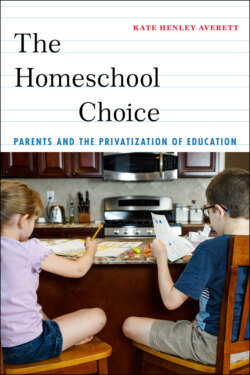Читать книгу The Homeschool Choice - Kate Henley Averett - Страница 18
На сайте Литреса книга снята с продажи.
Current Homeschooling Regulations
ОглавлениеOver the course of just a few decades, then, homeschooling in the United States went from being a deviant, often illegal, practice to one that is increasingly normalized.20 Homeschooling is now seen by many as an acceptable alternative to public education; however, because homeschooling, like all other forms of education, is overseen by states rather than the federal government, the degree of regulation of homeschooling varies widely across the United States.
Texas falls on the less-regulated side of the spectrum—while a handful of states are as unregulated, none are more unregulated.21 Homeschool parents are not required to register with the state, and because homeschools are considered private schools under Texas law, they are subject to the same (lack of) regulation as other private schools.22 Many of the homeschoolers I spoke with over the course of my research took great pride in Texas’s lack of regulation. I even acquired a bit of “conference swag” at one of the Texas Home School Coalition conferences that I attended that allowed me to partake in the national “bragging rights” of the state’s homeschoolers: a bright red, reusable shopping bag emblazoned with the Texas flag and the words “I homeschool in Texas, where people are FREE.”
On the other end of the spectrum, with high levels of regulation, are states like New York. Parents who homeschool in New York must submit a yearly notice of intent to their local school district superintendent, submit a yearly “Individualized Home Instruction Plan,” file quarterly reports on the child’s progress, including grades or narrative evaluations for each subject, and assess the child through standardized tests (yearly in grades 1–3 and 9–12, and every other year in grades 4–8).23 Other states fall somewhere between the two, requiring registration with the state and/or some form of assessment or reporting, though few states require quite as rigorous reporting as New York.24
Homeschoolers themselves are far from being of one mind about the question of state regulation of homeschooling, and what the “right” degree of regulation should be.25 While some of the parents I interviewed expressed concern about the lack of oversight of homeschooling in Texas, others—including parents on both the political Right and the political Left—expressed a deep appreciation for being able to homeschool without the government telling them what to do. This debate has occasionally reached the mainstream, often arising when cases of child abuse by homeschooling parents make headlines. It is important to note that while there is no evidence that homeschooling families are more likely to abuse their children, some critics argue that homeschooling—particularly in states with little to no oversight—is a tool that abusive parents can use to hide abuse from the outside world through limiting their children’s interactions with institutions and adults who are mandated reporters.26
